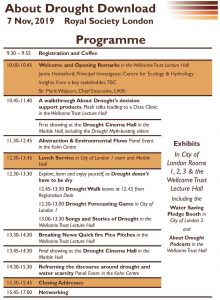By Dr Helen Gavin, Project Manager for MaRIUS
Research from the MaRIUS project is widely recognised as having transformed how water risks are managed by the Government, water suppliers and regulators.
MaRIUS (Managing the risks, impacts and uncertainties of droughts and water scarcity) developed the first national-scale water resource model for England and Wales, triggering a transition in government policy and industry practice. Between 2014 and 2020 MaRIUS research involved new theory, the creation of new datasets and models, validation and demonstration in case studies of how the risk of droughts can be assessed and better managed through system modelling and ‘outcomes-based’ approaches to decision making. To date, four major reports have drawn on its work: ‘Water UK Long Term Planning Framework (2016); the National Infrastructure Commission’s ‘Preparing for a drier future, England’s water infrastructure needs’ (2018); the Committee on Climate Change’s CCRA3 Water Availability study (2018-19) and the Environment Agency’s report ‘Meeting our Future Water Needs: A National Framework for Water Resources’ (2020).
Prof Jim Hall, Principal Investigator (PI) of MaRIUS and Professor of Climate and Environmental Risks at the University of Oxford, is a member of the Prime Minister’s Council of Science and Technology and an Expert Advisor to the National Infrastructure Commission. The project was based at the Environmental Change Institute in Oxford.
“Our research has caused a transition in government policy and industry practice for water resource management in England. It has shown how drought risks can be assessed and better managed through system modelling and ‘outcomes-based’ approaches to decision making.
“We have achieved a significant shift in thinking and practice by the regulators, through interaction over eight years with water companies, the Environment Agency, Ofwat, Defra and the National Infrastructure Commission.”
Professor Jim Hall, University of Oxford
The increasing frequency of droughts and water scarcity in our warming climate, combined with our growing population and increasing demands for supply present huge challenges for national and local government, water suppliers, energy, agriculture, infrastructure, industry and communities.
MaRIUS’s work has provided conceptual frameworks and methodologies that have enabled government and its agencies to address these challenges and has provided data, systems models and other evidence that are transforming policy and practice. The new water resource system simulation model integrates public water supplies with use of water in agriculture, power generation and other industries. It has been used to explore different future scenarios of drought and assess the frequency, duration and severity of water shortages now and in the future. Tools have been developed to explore trade-offs between different aspects of risk and the cost of alternative management plans.
Key to the take-up of MaRIUS’s research was a series of well-managed and effective workshops where potential users sat down with the leading researchers to explore datasets, models and tools in development, sharing their real-world decision-making and communications processes.
“We are continuing to work very closely with the Environment Agency and Ofwat, at their request. We are undertaking joint resilience assessments and exploring the impacts on water resources. We continue to train Environment Agency staff on our model and will transfer this tool to them as they wish to use it to fulfil their regulatory responsibilities.”
Professor Jim Hall, University of Oxford


